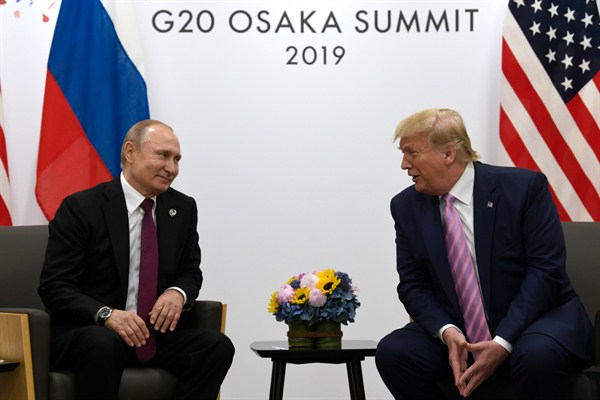Editor’s Note: Guest columnist Neil Bhatiya is filling in for Stewart Patrick this week.
After a long delay, the Trump administration finally took the first steps in a legally mandated effort to punish Russia for its use of chemical weapons in the 2018 poisoning of Sergei Skripal, the former Russian spy living in the United Kingdom. On Aug. 1, the administration issued an executive order outlining the nature of sanctions it could impose on Russia, focused on restrictions on lending to Russian government or government-affiliated entities.
Because Moscow continues to deny its role in the attack and has taken no steps to address its alleged behavior since initial sanctions imposed by the Trump administration in August 2018, the follow-up sanctions were a legal requirement mandated by the 1991 Chemical and Biological Weapons Control and Warfare Elimination Act. Curiously, however, the executive order came just a day after President Donald Trump and Russian President Vladimir Putin spoke by phone to discuss wildfires plaguing Siberia and prospects for bilateral trade.
Putin is likely not the only one who is confused by the administration’s seemingly contradictory approach to relations, or what comes next. It took another 24 hours for the State Department to release guidance on how it would implement the executive order. These stipulations spell out the specific kind of debt financing to be targeted, along with new export restrictions, should sanctions be implemented. The State Department chose to target a narrower band of debt instruments than the executive order allowed. Specifically, it barred U.S. banks from participating in the primary market issuance of debt to the Russian government in denominations other than the ruble. The ban would include dollar- and euro-dominated bonds, but exclude the kind of domestic Russian treasury bills that have been popular with foreign investors. The State Department guidance also stipulates that the administration will reassess in a year whether to continue the sanctions. To win their revocation under the chemical weapons statute, the Russian government would have to admit responsibility for the Skripal attack, including compensating the victims, and take steps to ensure it would not use chemical weapons in the future.

